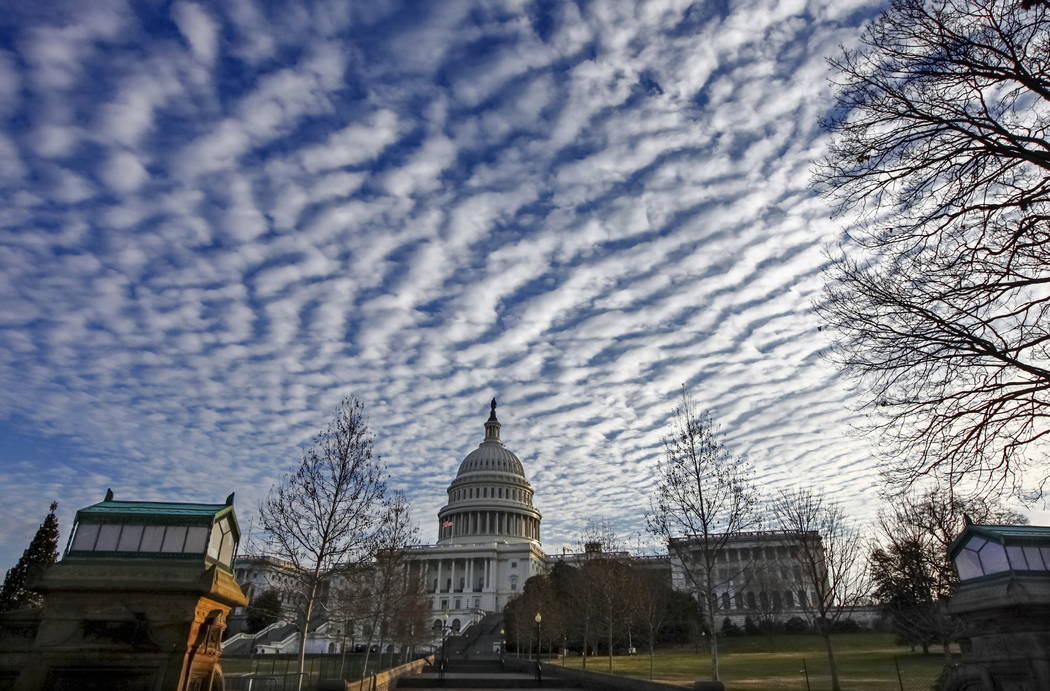Congress facing host of issues when lawmakers return in January
WASHINGTON — Lawmakers dashed out of town Friday for the holidays, but they face mounting financial issues, a budget showdown, an immigration bill and measures to shore up public health care exchanges when Congress returns in early January.
Republicans left after passing a sweeping tax-cut bill that overhauls the tax code for the first time in 30 years, gives breaks to corporations, businesses and individuals, while heaping a projected $1.5 trillion in additional obligations on the deficit. President Donald Trump signed the bill into law on Friday.
“Christmas is coming early for the American people,” said House Speaker Paul Ryan, R-Wis.
Sen. Dean Heller, R-Nev., called the tax bill a “once-in-a-generation” opportunity to “give hardworking families in Nevada the tax cuts they’ve been waiting for.”
The bill passed without support from Democrats, and public opinion polls show Americans believe the benefits from the bill are skewed toward corporations and the wealthy at the expense of the middle-class.
Still, Republicans were eager to return home to tout their legislative victory after a year of stumbling efforts to repeal the Affordable Care Act, known as Obamacare, and intra-party fighting on other issues.
The House and Senate both passed continuing resolutions on Thursday that keep the government funded until Jan. 19, and extend the Children’s Health Insurance Program until March.
But states like Nevada are urging a long-term funding solution for the program that provides health care to 9 million children nationally.
The House also passed a $81 billion disaster assistance bill to give flood-ravaged Texas, Florida and Puerto Rico relief, and provide help to Western states like California that have been hard-hit by wildfires.
But the Senate failed to take up the disaster bill and must address it when it returns in early January.
Issues dear to Nevada
Also pending are issues pertinent to Nevada, including full reauthorization of CHIP, passage of the DREAM Act, fuding for Veterans Affairs and providing federal assistance to communities shattered by the opioid crisis.
Sen. Catherine Cortez Masto, D-Nev., the first Latina elected to the Senate, has championed legislation to provide protection from deportation for 800,000 men and women who were brought into this country illegally.
Trump ended the Deferred Action for Childhood Arrivals (DACA) program, an Obama-era policy, in September but gave Congress six months to craft a legislative remedy.
Senate Republican leaders have promised a vote on the bipartisan Development, Relief and Education for Alien Minors (DREAM) Act next month, said Sen. Jeff Flake, R-Ariz., who sought the concession as part of his support for the tax-cut package.
Cortez Masto said she will “not stop fighting until we pass the Dream Act.”
In the House, Democratic Reps. Dina Titus, Jacky Rosen and Ruben Kihuen, all of Las Vegas, support a long-term CHIP solution and immigration legislation to address the Dreamers.
Rosen said Congress “is running out of opportunities to fix President Trump’s cruel and heartless decision to end the DACA program.”
Rep. Mark Amodei, a Republican whose district includes northern Nevada, has signed a discharge petition that would have forced the House to act on an immigration bill before year’s end.
“As I have said before, it’s impossible to defend doing nothing in circumstances like this,” Amodei said, adding that he had favored putting the bill on the floor for debate and amendment.
Extending CHIP
Meanwhile, Gov. Brian Sandoval, a Republican, and other governors are urging Congress to reauthorize the CHIP program, which expired Sept. 30. Congress this week extended funding until March.
The Senate has drafted bipartisan legislation that would reauthorize the program for another five years. But the House passed a reauthorization bill that calls for reforms opposed by Democrats.
In Nevada, CHIP provides health care and immunizations for 69,000 children each year.
Congress must also tackle spending bills when a continuing resolution that keeps the government funded at fiscal year 2017 levels expires Jan. 19.
Included in the spending bills is $150 million to restart licensing on the Yucca Mountain nuclear repository project in Nevada.
The House must still pass an energy bill that authorizes the spending, which includes $120 million for the Department of Energy and $30 million for the Nuclear Regulatory Commission to hire staff and prepare to resume licensing.
President Barack Obama pulled funding for the process during his second term in office.
But Trump sought funds to restart the application process in his budget for fiscal year 2018, which began Oct. 1.
The Senate has yet to draft legislation that would address permanent nuclear storage, although Sen. Lamar Alexander, R-Tenn., chairman of the Senate Appropriations subcommittee on energy and water development, said he sees Yucca Mountain as part of a comprehensive plan to address the rising stockpiles of nuclear waste at power plants.
Yucca Mountain was designated by Congress as the nation’s repository for nuclear waste in 1987.
Contact Gary Martin at gmartin@reviewjournal.com or 202-662-7390. Follow @garymartindc on Twitter.
Trump signals next priority
President Donald Trump is promising to work with Democrats next year, starting with shoring up the nation's crumbling roads and bridges.
He tweeted Friday, "I predict we will start working with the Democrats in a Bipartisan fashion. Infrastructure would be a perfect place to start."
The president added, "It is time to start rebuilding our country!"
Trump tweet
The statement of priorities came as Trump was preparing to leave for Mar-a-Lago, his resort in Florida. He is expected to release a framework for increased infrastructure spending in January.
, relying on a mix of federal, local and private spending. Trump has used the deadly train derailment in Seattle to call for more infrastructure spending. The accident happened on a newly completed bypass.
— The Associated Press

















